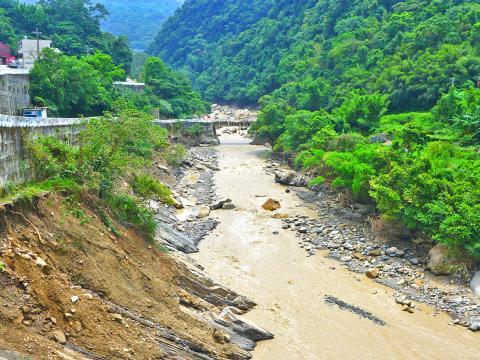Taipei Mayor Ko Wen-je (柯文哲) yesterday attributed the turbidity of tap water in areas of the city following Typhoon Soudelor to poor soil and water conservation efforts upstream of Nanshih River (南勢溪), saying that water transferred to purification plants had given rise to the problem.
The poor quality of tap water sparked waves of panic buying in Taipei and New Taipei cities over the weekend.
Asked whether the Taipei City Government had been slow to take action to address the tainted water, Ko said that the city government is not at fault, as it has carried out extensive soil and water protection measures along the Beishih River (北勢溪), which flows into the reservoir.

Photo: Lee Ya-wen, Taipei Times
“This is not the first time Taipei has been hit by a typhoon of this magnitude, but the city’s raw water turbidity surpassed 30,000 nephelometric turbidity units [NTU] over the weekend, indicating a problem,” Ko said.
The city would ask the central government to inspect areas upstream of the Nanshih River and make the necessary improvements to the city’s water supplies, he said.
Taipei Water Department Commissioner Chen Chin-hsiang (陳錦祥) said that no water had been supplied from Feitsui Reservoir (翡翠水庫) over the weekend, as city policy stipulates that water from Nanshih River be tapped first, and that water from the reservoir serve as a complement to cover the city’s water needs when necessary.
He said that as Nangshih River is governed by the Taipei Water Management Office, overseen by the Water Resources Agency, the city government can only offer the office suggestions on how to boost conservation efforts along the river.
He said the highest raw water turbidity the city had previously seen was 12,000 NTUs, recorded following Typhoon Soulik in 2013, which the department was then able to treat and continue the supply of clean water.
However, the department faced “great difficulty” treating contaminated water following Typhoon Soudelor, when water turbidity shot up from 10,000 NTUs at 7am on Saturday to 30,000 NTUs at 8am, forcing the departments in Chang Hsing, Gongguan and Jhihtan to limit water tapped from the Nanshih River, Chen said.
He said poor soil and water conservation measures led to numerous mudslides during Typhoon Soudelor, which likely contaminated water in the river, adding that access to New Taipei City’s Wulai District (烏來) — located downstream of the river — was still blocked as a result of mudslides as of press time last night.
Water quality was back to normal yesterday, with raw water and tap water turbidity dropping below 200 NTUs and 1 NTU respectively, Chen said.
However, Taipei Department of Health Secretary-General Hsu Chao-chen (許朝程) urged the public to boil water five minutes longer than they normally would over the next couple of days to eliminate the potentially pathogenic chloroform often associated with impurities in water.

CHAOS: Iranians took to the streets playing celebratory music after reports of Khamenei’s death on Saturday, while mourners also gathered in Tehran yesterday Iranian Supreme Leader Ayatollah Ali Khamenei was killed in a major attack on Iran launched by Israel and the US, throwing the future of the Islamic republic into doubt and raising the risk of regional instability. Iranian state television and the state-run IRNA news agency announced the 86-year-old’s death early yesterday. US President Donald Trump said it gave Iranians their “greatest chance” to “take back” their country. The announcements came after a joint US and Israeli aerial bombardment that targeted Iranian military and governmental sites. Trump said the “heavy and pinpoint bombing” would continue through the week or as long

TRUST: The KMT said it respected the US’ timing and considerations, and hoped it would continue to honor its commitments to helping Taiwan bolster its defenses and deterrence US President Donald Trump is delaying a multibillion-dollar arms sale to Taiwan to ensure his visit to Beijing is successful, a New York Times report said. The weapons sales package has stalled in the US Department of State, the report said, citing US officials it did not identify. The White House has told agencies not to push forward ahead of Trump’s meeting with Chinese President Xi Jinping (習近平), it said. The two last month held a phone call to discuss trade and geopolitical flashpoints ahead of the summit. Xi raised the Taiwan issue and urged the US to handle arms sales to

BIG SPENDERS: Foreign investors bought the most Taiwan equities since 2005, signaling confidence that an AI boom would continue to benefit chipmakers Taiwan Semiconductor Manufacturing Co’s (TSMC, 台積電) market capitalization swelled to US$2 trillion for the first time following a 4.25 percent rally in its American depositary receipts (ADR) overnight, putting the world’s biggest contract chipmaker sixth on the list of the world’s biggest companies by market capitalization, just behind Amazon.com Inc. The site CompaniesMarketcap.com ranked TSMC ahead of Saudi Aramco and Meta Platforms Inc. The Taiwanese company’s ADRs on Tuesday surged to US$385.75 on the New York Stock Exchange, as strong demand for artificial intelligence (AI) applications led to chip supply constraints and boost revenue growth to record-breaking levels. Each TSMC ADR represents

State-run CPC Corp, Taiwan (CPC, 台灣中油) yesterday said that it had confirmed on Saturday night with its liquefied natural gas (LNG) and crude oil suppliers that shipments are proceeding as scheduled and that domestic supplies remain unaffected. The CPC yesterday announced the gasoline and diesel prices will rise by NT$0.2 and NT$0.4 per liter, respectively, starting Monday, citing Middle East tensions and blizzards in the eastern United States. CPC also iterated it has been reducing the proportion of crude oil imports from the Middle East and diversifying its supply sources in the past few years in response to geopolitical risks, expanding